May 16, 2025 | 10:12 GMT +7
May 16, 2025 | 10:12 GMT +7
Hotline: 0913.378.918
May 16, 2025 | 10:12 GMT +7
Hotline: 0913.378.918
With nearly 127,000 hectares of mature forest in addition to 40,000 hectares of newly-planted forest (mainly acacia), Binh Dinh aims at having 30,000 hectares of large-size timber production forests certificated by the Forest Stewardship Council (FSC) by 2035.
Ha Thanh Forestry Limited Company situated in Van Canh district (Binh Dinh province) is among the companies chosen by Binh Dinh province as pioneers in a large-size timber production forest pilot program.
According to Pham Ba Nghi, Director of Thanh Ha Forestry Ltd Company, the company had a total of 2,564 hectares of forest approved by the People's Committee of Binh Dinh province for large-size timber production, of which the converted area was 600.5 ha and nearly 2,000 ha were replanted after harvest.
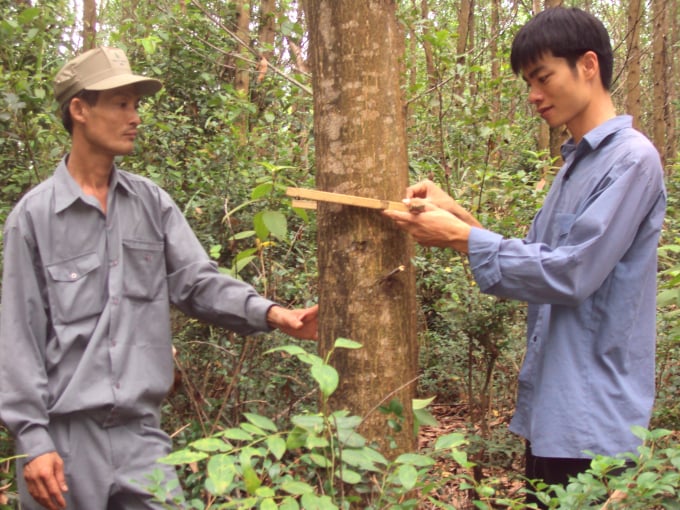
The staff of Ha Thanh Forestry Ltd. Company are checking forest tree periodically. Photo: V.D.T.
For the period from 2016 until 2020, Thanh Ha Forestry Ltd Company planted large-size timber trees on more than 1,659 ha of which above 298 ha was newly-planted trees, 732 ha was replanted after harvest and over 628ha was converted from its existing forest area. The company favored hybrid acacia to develop large-size timber production forests at the planting density of 1,600-2,000 plants /ha.
"In recent years, we haven't converted the existing forests into large-size timber plantations by thinning as conditions did not allow. Besides, it was expensive and ineffective. We only develop large-size timber plantation on new forest areas and on harvested forests," said Pham Ba Nghi, Director of Ha Thanh Forestry Ltd Company.
He also added that for the period from 2021 to 2025 the company will continue to plant large-size timber forests on more than 1,400 ha.
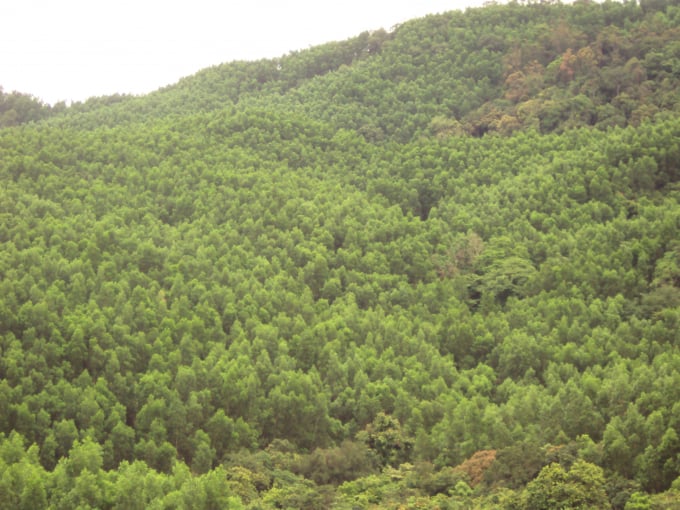
A large area of large-size timber plantation under the management of Ha Thanh Forestry Ltd Company is in the remote areas of Binh Dinh province. Photo: L.K.
Ha Thanh Forestry Ltd Company has been surrounded by difficulties in the process of planting large-size timber forests. Nghi said the first problem was forest land fragmentation in addition to inconvenient terrain, making it hard for forest plantation and protection.
Besides, large-size timber plantation requires high investment cost because the business cycle of large-sized timber production forests is twice as long as that of small-size timber forests while commercial banks normally set high interest rates on loans and low borrowing limits.
Currently, lumber prices are unstable and there is a lack of close link between forest planting units and wood processing businesses. Along with that, many shortcomings still exist in forest management policy. In addition, most large-size timber production forests are in the remote areas with traffic inconvenience, especially in the raining season while forestry infrastructure is not invested properly and planted forests are easily affected by extreme weather phenomena.
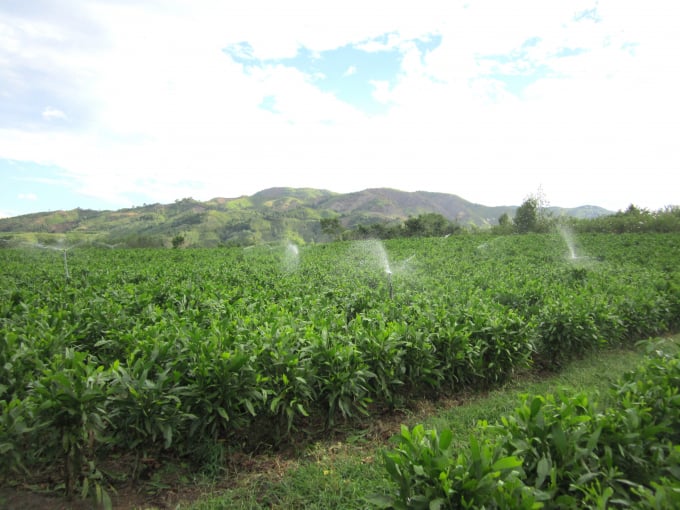
A nursery of Ha Thanh Forestry Ltd Company. Photo: V.D.T.
"The lack of varieties for forest plantation is another problem. Only a few varieties of hybrid acacia such as BV10, BV16, BV32, BV35 are frequently used for plantation. Hybrid acacia varieties grow fast but they are at risk for diseases. Recently, diseases have attacked many forests causing tree dieback in mass," Nghi said.
For the development of large-size timber production forests, Binh Dinh is striving to increase the productivity of planted forests by 25-30m3/ha/year; improve the quality of planted forests to reach timber reserves of 190-240m3/ha for 12-year-old planted forests and from 100-120m3/ha for 7-year-old planted forests. To achieve the goals, good seedlings are foremost.

Growers need to have a large amount of money to develop large-size timber production forests. Photo: L.K.
According to Chairman of Quy Nhon Forestry Company Limited Tran Nguyen Tu, to have good seeds for forest plantation the company has been working with Seed and Biotechnology Research Institute to produce high-quality seedlings with the use of plant tissue culture techniques.
"We are managing our planted forests on the basis of scientific and practical combination to ensure sustainability in terms of economy, society and environment, meeting the principles of sustainable forest management. We aim at 100% forest area certificated by FSC," said Tran Nguyen Tu, Chairman of Quy Nhon Forestry Company Limited.
Sharing the same perspective, Pham Ba Nghi, Director of Ha Thanh Forestry Ltd Company said developing seedlings with the use of plant tissue culture techniques was extremely important for forest plantation with the focus on researching, selecting high-yielding and disease-resistant varieties.
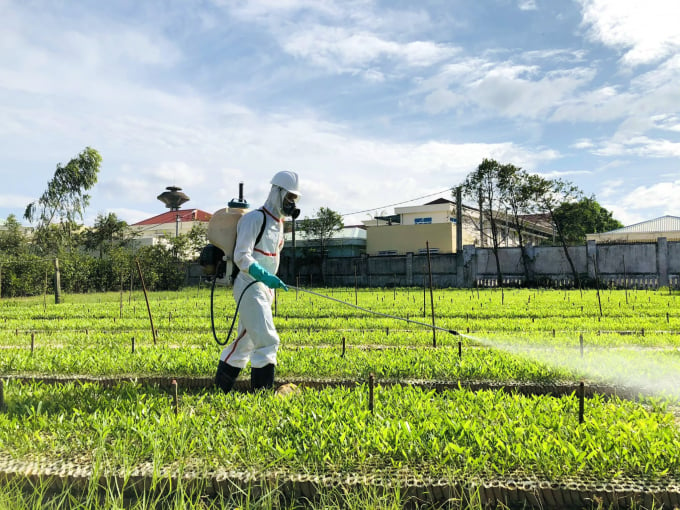
A nursery of Quy Nhon Forestry Ltd Company in Quy Nhon city. Photo: V.D.T.
"We need a supporting policy to invest in infrastructure for the areas engaged in large-size timber production. Priority will be given to road system to make forest plantation and protection more convenient. Particularly, we will create fire resistant barriers to prevent forest fires. Additionally, we will try our best to maintain FSC certification for all our planted forests in order to add value to forestry products. Because of the long business cycle of large-sized timber production forests I would like to make a proposal that the government should develop a supporting insurance policy for enterprises and individuals engaged in large-size timber production so that they can rest assured with forest production," Director of Ha Thanh Forestry Ltd Company, Pham Ba Nghi suggested.
Translated by Mai Tham

(VAN) Vietnam’s TH Group officially put its high-tech fresh milk processing plant into operation in the Russian Federation, marking a historic moment as the first TH true MILK cartons were produced in Russia.

(VAN) Use of high-quality broodstock and biotechnology is regarded as the most effective approach to ensuring sustainable and economically viable shrimp aquaculture ahead of climate change and the emergence of increasingly intricate disease patterns.

(VAN) Carbon farming is a form of agricultural practices that helps absorb more greenhouse gases than it emits, through smart management of soil, crops, and livestock.

(VAN) This is a key content of the Memorandum of Understanding recently signed between the Vietnam Fisheries Society and Kunihiro Inc of Japan.

(VAN) To achieve the goal, local authorities and businesses in Kon Tum province have fully prepared the necessary conditions for the new Ngoc Linh ginseng planting season.
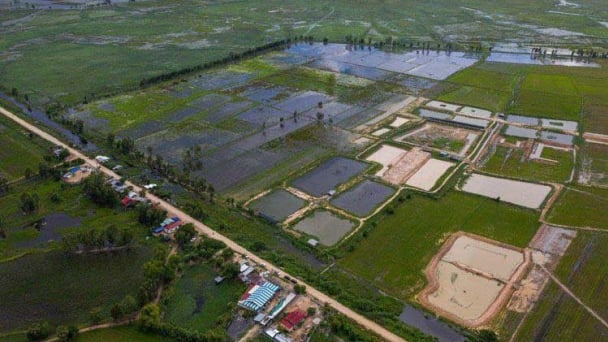
(VAN) Jiangsu province is gearing up to host training programs in Phnom Penh, the capital of Cambodia, this year to establish the Fish and Rice Corridor.
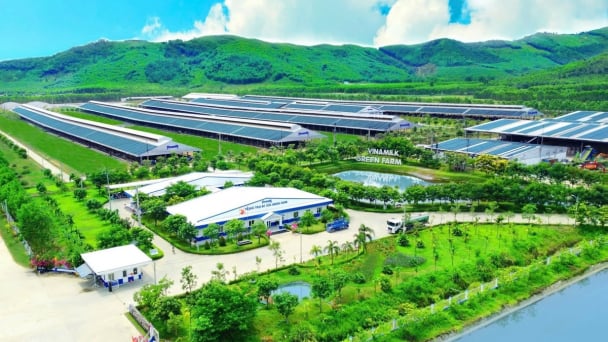
(VAN) Le Hoang Minh, representing Vinamilk, shared the company's experience in energy saving and green energy transition for production at a workshop held during the P4G Summit.